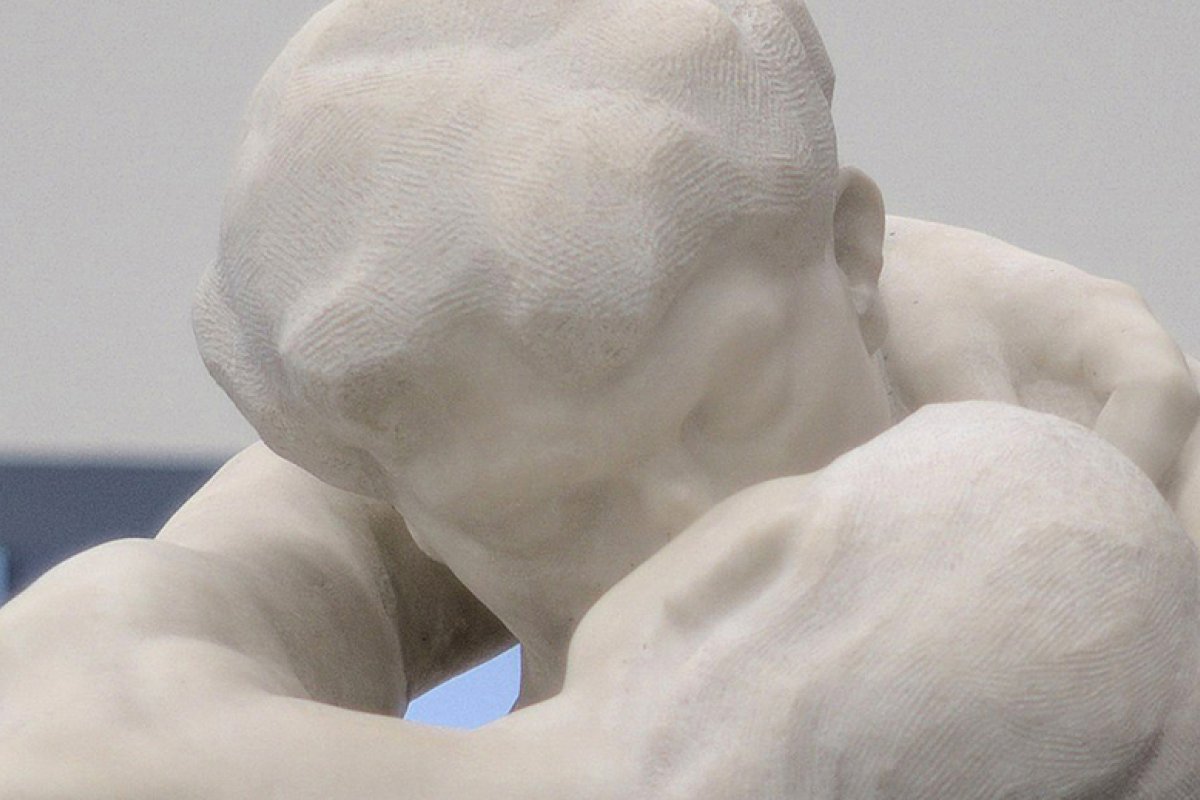
The Symbolism of a Kiss?
A single human action can take on multiple meanings, personal, social, cultural, and even moral and religious.
§1.
It is an obvious truth that a single human action can take on multiple meanings, personal, social, cultural, and even moral and religious. The ambiguity of an action often inspires artistic creation, especially about the sacred. Auguste Rodin's famous sculpture called "The Kiss" reworks the tragic love of Francesca and Paolo from Dante's Divine Comedy. Rodin transforms the hellish kiss into a moving tribute to pure love. But is their love pure and/or profane? 1 Is their act innocent or immoral? Ambiguity and perplexity around the significance of specific kisses is not, in fact, unusual throughout the history of religions.
There has been a firestorm in the past weeks on social media about a kiss, an act that has even caught the attention of the mainstream media. The kiss in question is, surprisingly, the Dalai Lama kissing a young boy and asking him to "suck his tongue." 2 That act is perplexing, if nothing else, and so needs some interpretation in order to understand its meaning. But, dear reader, be mindful that understanding does not mean justifying an action. So, we are facing a perplexity, an ambiguity, that demands both interpretation and judgment. The interpreter with good will must halt the rush to judgment until some understanding is reached.
The kiss in question concerns a young boy who approach the Dalai Lama at an event in February in northern India. The boy asked for a hug. He was invited to the stage and the boy hugged the Dalai Lama, who also asked to be kissed on the cheek. His Holiness then kissed the boy on the mouth and then asked the youngster to suck his tongue. Last week a video of the interaction went viral and brought swift condemnation on many social media platforms. Within days, the Dalai Lama issued an apology, but only for the words he spoke and not for his actions.
Two other facts are in play. One is that the Dalai Lama is, as some have said, a jokester, a fact that is noted by his office adding that he often teases people in an "innocent way." That claim merely deepens a viewer's perplexity: are there acts that cannot and ought not be done even in an innocent and teasing way; does it make a difference who does the kissing and who receives, especially if one is believed to be, as the Dalai Lama is, human and divine? The second fact is that there have been many instances of sexual abuse by religious leaders, not just among Catholic priests, but in other Christian traditions as well as many religions. Little wonder that global culture (if we imagine such a thing) is outraged by the Dalai Lama's actions and was swift in its strident condemnation.
§2.
Assessing the global response to the Dalai Lama's action or his office's explanation is not the focus of this article, nor is the global fact of sexual abuse in the religions, nor even its ongoing manifestation in the Catholic church. 3 We will shift from interpretation to judgment later. The interest now is the complex role kisses play in the religions, from Dante's Hell to the biblical account of God breathing live into dust and thus creating a human being. It might be helpful, then, to develop, undoubtedly incomplete, a "symbolism of the kiss." In order for me to do so, I need to shift from the Tibetan Buddhist canon to the Hebrew and Christian Bibles and the Western cultural imagination where I can claim some knowledge.
At the extremes are undoubtedly the “kiss of peace,” an ancient Catholic practice found in other Christian traditions as well, and the kiss of death, Judas’s betrayal of Jesus by a kiss (see Matthew 26:48-49 and parallels). Judas' act carried its own condemnation in its act of betrayal, but the justification of the action ranges from a payment of 30 gold pieces, in the Synoptic Gospels, to possession by Satan in the Gospel of John. Notice that both actions, a kiss of peace and a kiss of death, are communicative acts. In Judas' action the communication is by dissimulation, a seeming recognition of his Master but meant to be a signal to Jesus' captors. The kiss of peace, by contrast, is a gift mutually given among believers.
Less extreme symbolisms of a kiss, if no less ambiguous, are found in Genesis 50 when Joseph after the death of Jacob falls on his father and kisses his face. This is obviously an expression of love and loss, but it is complicated by ritual practice in Egypt and the seeming transfer of patriarchal rule. What then is the justification for the kiss, or does it have several? In another kiss we find forgiveness and the abundance of grace. In the parable of the Prodigal Son, the father, seeing his son's returns, has compassion, runs to him, and kisses him (Luke 17:15-20). Here is not the death of a father that evokes a kiss, but, as the text has it, the father's explanation that his son was dead and is now alive. In these cases, the symbolism surrounds life and death, fathers and sons. These kisses are less about acts of communication, whether authentic (the kiss of peace) or deceitful (the kiss of death), as they mark the liminality between life and death, grace and loss. As such they call for justification either from practices surrounding death (Joseph and Jacob) or the vibrancy of life returned (the Prodigal Son).
§3.
It should be clear from this brief detour of interpretation that the rush to judgment without understanding is too easily wide of the mark. This is not to deny in any way that sexual abuse is always wrong. It is. Full stop. But it does suggest that interpretation and judgment must traffic together. In fact, according to a BBC article in 2014, and one by the Institute of East Asia Studies by UC Berkeley as well, "sticking out your tongue can be considered as rude, but in Tibet, it's a way of greeting." As the BBC further notes, the custom "has been a tradition followed by the Tibetan people since the ninth century, when the region was ruled by Lang Drama, who was known for a black tongue, said the outlet. After the death of the king, the locals started showing their tongues when asked to confirm that they are not like him (or his reincarnation)." 4 People familiar with Tibetan customs have noted that the Dalai Lama’s actions must be read through the idioms and forms of greeting found in Tibet. 5 This is an important interpretive point, even if we reach the judgment that the Dalai Lama acted inappropriately.
Two things thereby stand out in this sighting of religion in a kiss. First, we should be thankful that sensitivity to and condemnation of acts of sexual abuse within the religions now has global scope. This shows, I think, a deepening and widening of moral sensibility and acknowledgment of both human vulnerability and dignity sorely needed in our age. At the same time, it shows, second, that scholars of religion and religious people themselves have serious work to do to ensure that judgment and proper understanding work together. In this light, the Dalai Lama's office was right to apologize since no one can assume mutual understanding of religious and cultural meanings. That was an act of interpretation. But that office should also have grasped that in some human affairs, like kissing, actions speak louder than words.
1 See, also see https://artsandculture.google.com/asset/the-kiss/7gekhm5e_vzxga?hl=en. Accessed originally on April 10, 2023, at 4:00pm CST.
2 https://www.cnn.com/videos/world/2023/04/10/dalai-lama-kiss-young-boy-apology-vedika-sud-ovn-intl-ldn-vpx.cnn. Accessed originally on April 16, 2023, at 4:00pm CST.
3 For a recent example see https://www.nytimes.com/2023/04/17/us/theodore-mccarrick-cardinal-sex-assault-wisconsin.html
4 https://www.ndtv.com/world-news/explained-the-controversy-over-viral-video-of-dalai-lama-3935784. Accessed April 17, 2023, at 7:00 pm.
5 https://www.cnn.com/2023/04/13/india/tibetan-leader-defends-dalai-lama-kissing-boy-video-intl-hnk/index.html. Also see https://tricycle.org/article/dalai-lama-actions/?fbclid=IwAR3-SSEB0SMrzfU-DeazluJ2CsFYm8J5X969oS-mT75mk0ByZ4ozGdkELlE
Image (cropped) from Wikimedia Commons


